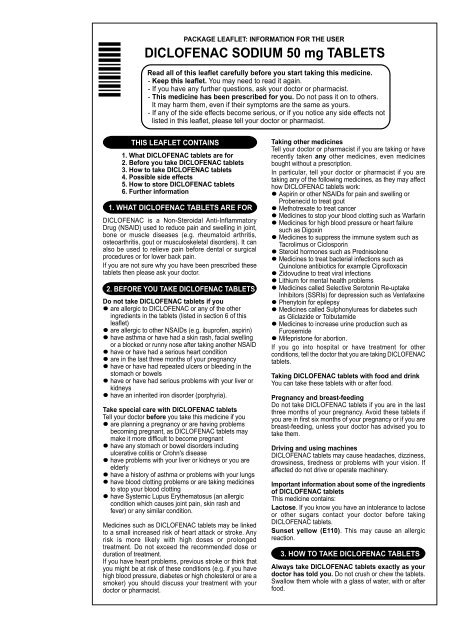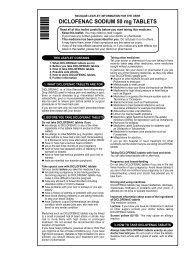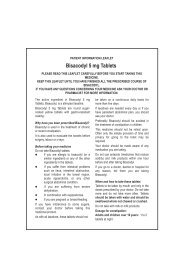DICLOFENAC SODIUM 50 mg TABLETS - Genesis
DICLOFENAC SODIUM 50 mg TABLETS - Genesis
DICLOFENAC SODIUM 50 mg TABLETS - Genesis
You also want an ePaper? Increase the reach of your titles
YUMPU automatically turns print PDFs into web optimized ePapers that Google loves.
PACKAGE LEAFLET: INFORMATION FOR THE USER<strong>DICLOFENAC</strong> <strong>SODIUM</strong> <strong>50</strong> <strong>mg</strong> <strong>TABLETS</strong>Read all of this leaflet carefully before you start taking this medicine.- Keep this leaflet. You may need to read it again.- If you have any further questions, ask your doctor or pharmacist.- This medicine has been prescribed for you. Do not pass it on to others.It may harm them, even if their symptoms are the same as yours.- If any of the side effects become serious, or if you notice any side effects notlisted in this leaflet, please tell your doctor or pharmacist.THIS LEAFLET CONTAINS1. What <strong>DICLOFENAC</strong> tablets are for2. Before you take <strong>DICLOFENAC</strong> tablets3. How to take <strong>DICLOFENAC</strong> tablets4. Possible side effects5. How to store <strong>DICLOFENAC</strong> tablets6. Further information1. WHAT <strong>DICLOFENAC</strong> <strong>TABLETS</strong> ARE FOR<strong>DICLOFENAC</strong> is a Non-Steroidal Anti-InflammatoryDrug (NSAID) used to reduce pain and swelling in joint,bone or muscle diseases (e.g. rheumatoid arthritis,osteoarthritis, gout or musculoskeletal disorders). It canalso be used to relieve pain before dental or surgicalprocedures or for lower back pain.If you are not sure why you have been prescribed thesetablets then please ask your doctor.2. BEFORE YOU TAKE <strong>DICLOFENAC</strong> <strong>TABLETS</strong>Do not take <strong>DICLOFENAC</strong> tablets if youare allergic to <strong>DICLOFENAC</strong> or any of the otheringredients in the tablets (listed in section 6 of thisleaflet)are allergic to other NSAIDs (e.g. ibuprofen, aspirin)have asthma or have had a skin rash, facial swellingor a blocked or runny nose after taking another NSAIDhave or have had a serious heart conditionare in the last three months of your pregnancyhave or have had repeated ulcers or bleeding in thestomach or bowelshave or have had serious problems with your liver orkidneyshave an inherited iron disorder (porphyria).Take special care with <strong>DICLOFENAC</strong> tabletsTell your doctor before you take this medicine if youare planning a pregnancy or are having problemsbecoming pregnant, as <strong>DICLOFENAC</strong> tablets maymake it more difficult to become pregnanthave any stomach or bowel disorders includingulcerative colitis or Crohn's diseasehave problems with your liver or kidneys or you areelderlyhave a history of asthma or problems with your lungshave blood clotting problems or are taking medicinesto stop your blood clottinghave Systemic Lupus Erythematosus (an allergiccondition which causes joint pain, skin rash andfever) or any similar condition.Medicines such as <strong>DICLOFENAC</strong> tablets may be linkedto a small increased risk of heart attack or stroke. Anyrisk is more likely with high doses or prolongedtreatment. Do not exceed the recommended dose orduration of treatment.If you have heart problems, previous stroke or think thatyou might be at risk of these conditions (e.g. if you havehigh blood pressure, diabetes or high cholesterol or are asmoker) you should discuss your treatment with yourdoctor or pharmacist.Taking other medicinesTell your doctor or pharmacist if you are taking or haverecently taken any other medicines, even medicinesbought without a prescription.In particular, tell your doctor or pharmacist if you aretaking any of the following medicines, as they may affecthow <strong>DICLOFENAC</strong> tablets work:Aspirin or other NSAIDs for pain and swelling orProbenecid to treat goutMethotrexate to treat cancerMedicines to stop your blood clotting such as WarfarinMedicines for high blood pressure or heart failuresuch as DigoxinMedicines to suppress the immune system such asTacrolimus or CiclosporinSteroid hormones such as PrednisoloneMedicines to treat bacterial infections such asQuinolone antibiotics for example CiprofloxacinZidovudine to treat viral infectionsLithium for mental health problemsMedicines called Selective Serotonin Re-uptakeInhibitors (SSRIs) for depression such as VenlafaxinePhenytoin for epilepsyMedicines called Sulphonylureas for diabetes suchas Gliclazide or TolbutamideMedicines to increase urine production such asFurosemideMifepristone for abortion.If you go into hospital or have treatment for otherconditions, tell the doctor that you are taking <strong>DICLOFENAC</strong>tablets.Taking <strong>DICLOFENAC</strong> tablets with food and drinkYou can take these tablets with or after food.Pregnancy and breast-feedingDo not take <strong>DICLOFENAC</strong> tablets if you are in the lastthree months of your pregnancy. Avoid these tablets ifyou are in first six months of your pregnancy or if you arebreast-feeding, unless your doctor has advised you totake them.Driving and using machines<strong>DICLOFENAC</strong> tablets may cause headaches, dizziness,drowsiness, tiredness or problems with your vision. Ifaffected do not drive or operate machinery.Important information about some of the ingredientsof <strong>DICLOFENAC</strong> tabletsThis medicine contains:Lactose. If you know you have an intolerance to lactoseor other sugars contact your doctor before taking<strong>DICLOFENAC</strong> tablets.Sunset yellow (E110). This may cause an allergicreaction.3. HOW TO TAKE <strong>DICLOFENAC</strong> <strong>TABLETS</strong>Always take <strong>DICLOFENAC</strong> tablets exactly as yourdoctor has told you. Do not crush or chew the tablets.Swallow them whole with a glass of water, with or afterfood.
DosageYour doctor will decide your dose, as it depends on yourcondition.Adults and children aged 12 years and above:Typical dose is 75-1<strong>50</strong> <strong>mg</strong> daily in two or three divideddoses.Elderly and patients with kidney problems: Requiresmaller doses. Follow your doctor’s advice.Children aged 12 years and above with juvenilearthritis: Your child will be given a dose depending ontheir bodyweight. Typical dose is 1-3 <strong>mg</strong>/kg daily individed doses.Children aged 12 years and above with fever relatedto an ear, nose or throat infection, or with painfollowing surgery: Your child will be given a dosedepending on their bodyweight. Typical dose is 2 <strong>mg</strong>/kgdaily in three divided doses; however this will depend onyour child’s condition.<strong>DICLOFENAC</strong> <strong>50</strong><strong>mg</strong> tablets are not recommended foruse in children under 12 years of age.If you take more <strong>DICLOFENAC</strong> tablets than youshouldContact your doctor or pharmacist immediately. Showthem the package or container.If you forget to take <strong>DICLOFENAC</strong> tabletsDon't worry, just take your next scheduled dose at thecorrect time. Do not take a double dose to make up forthe one you have missed.4. POSSIBLE SIDE EFFECTSLike all medicines, <strong>DICLOFENAC</strong> tablets can cause sideeffects, although not everybody gets them.STOP TAKING this medicine and seek immediatemedical help if you pass blood in your stools, passblack tarry stools or vomit blood or dark particles thatlook like coffee grounds.STOP TAKING this medicine and tell your doctorif you have:• indigestion, heartburn or aches and pains in thestomach area• an allergic reaction, which may cause asthma,wheezing or difficulty breathing; skin rash, itching orred and raised lumps (hives), skin peeling; swelling ofthe face or throat; blistering of the skin, mouth, eyesand genitals or sensitivity to sunlight• yellowing of the skin or whites of the eyes (jaundice)• unexplained bleeding, bruising, sore throat, generalillness or fever. Your doctor may wish to test yourblood.Medicines such as <strong>DICLOFENAC</strong> tablets may be linkedto a small increased risk of heart attack or stroke.Other side effects include:Common side effects:• headache, dizziness, nausea, vomiting• aches and pains in the stomach area• constipation, diarrhoea• gas, indigestion, heartburn• loss of appetite.Rare side effects:Effects on the heart:• fluid retention, high blood pressure• chest pain, a fast or irregular heart beat• heart failure.Effects on the liver or kidneys:• liver function disorders, including hepatitis• raised levels of liver enzymes in the blood• kidney problems, which may lead to swellingof the face and ankles, kidney failure or thepresence of blood or protein in the urine.Effects on the blood:• reduction in red blood cells (anaemia), whichcan make the skin pale and cause weaknessor breathlessness.Aseptic meningitis which may cause:• stiff neck, headache, nausea, vomiting, fever ordisorientation.Other effects:• numbness or tingling in the fingers, shaking, blurredor double vision, sudden loss of vision or pain onmovement of the eye, hearing loss or impairment,ringing in the ears, sleeplessness, nightmares,feeling irritable, depression, anxiety, nervousness,mental disorders, confusion, hallucinations, loss ofmemory, fits• drowsiness, a feeling of dizziness or spinning(vertigo), tiredness, general illness• difficulty breathing• loss of hair, disturbances in sensation• a red swollen tongue, mouth ulcers, taste changes• worsening of ulcerative colitis or Crohn's disease• an inflamed pancreas, which can cause severe painin the stomach area and back.If any of the side effects become serious, or if younotice any side effects not listed in this leaflet,please tell your doctor or pharmacist.5. HOW TO STORE <strong>DICLOFENAC</strong> <strong>TABLETS</strong>Keep out of the reach and sight of children.Do not store above 25°C. Store in the original packageor container and keep the container tightly closed.Do not use these tablets after the expiry date, which isstated on the package or container. The expiry daterefers to the last day of that month.Medicines should not be disposed of via wastewater orhousehold waste. Ask your pharmacist how to dispose ofmedicines no longer required. These measures will helpto protect the environment.6. FURTHER INFORMATIONWhat <strong>DICLOFENAC</strong> tablets containThe active ingredient in <strong>DICLOFENAC</strong> tablets is sodiumdiclofenac. The other ingredients are lactose,microcrystalline cellulose, maize starch, magnesiumstearate, colloidal anhydrous silica, cellulose acetatephthalate, macrogol 6000, castor oil,hydroxypropylcellulose, titanium dioxide (E171) andsunset yellow (E110).What <strong>DICLOFENAC</strong> tablets look like and contentsof the pack<strong>DICLOFENAC</strong> <strong>50</strong> <strong>mg</strong> tablets are round orange tabletswith the Chatfield logo engraved one side and DIC<strong>50</strong> onthe other.The tablets come in blisters packs and containers of 14,15, 21, 28, 42, 56, 70, 84 and 100 tablets. Not all packsizes may be marketed.Marketing Authorisation HolderChatfield Pharmaceuticals Limited,Kramer Mews, London SW5 9JLManufacturerDDSA Pharmaceuticals Limited,310 Old Brompton Road, London SW5 9JQFor more information about this product, please contactthe Marketing Authorisation Holder.This leaflet was last approved in 01/2011DIC0016/00<strong>50</strong>T/LEA005





